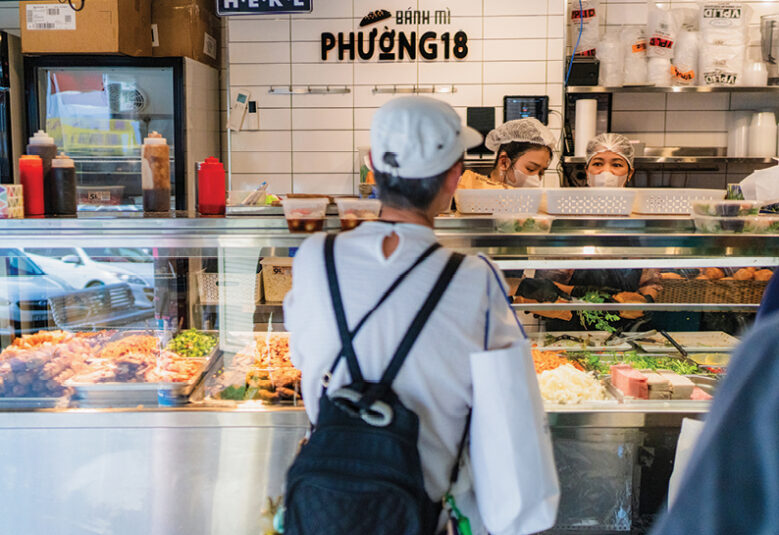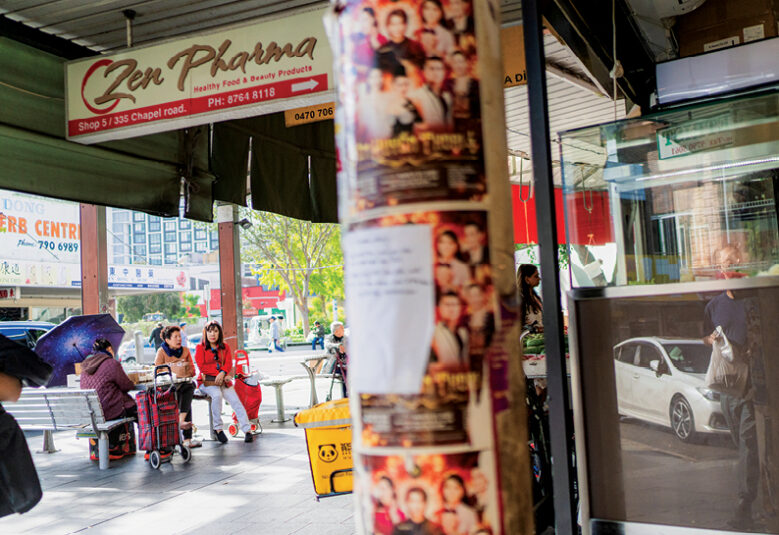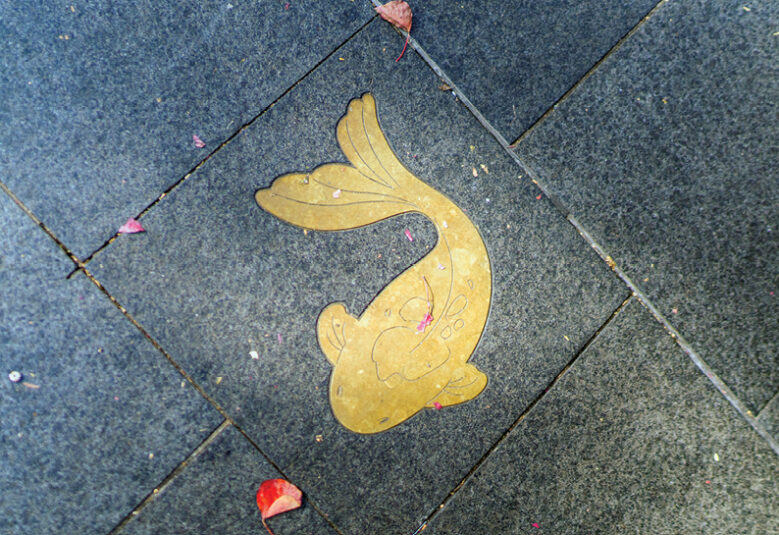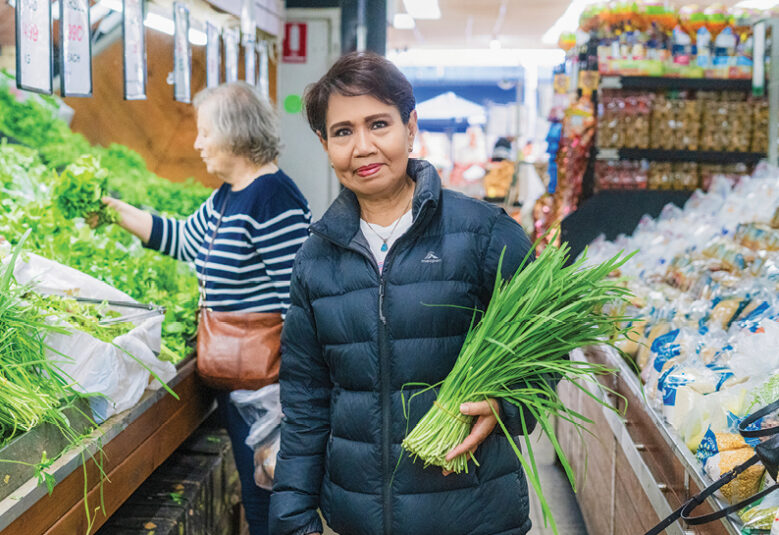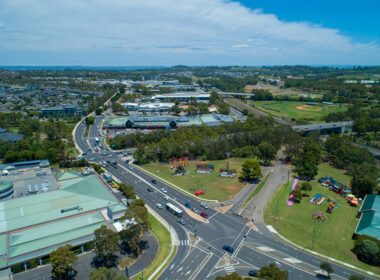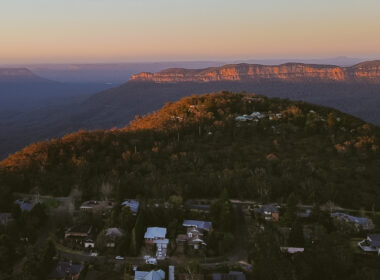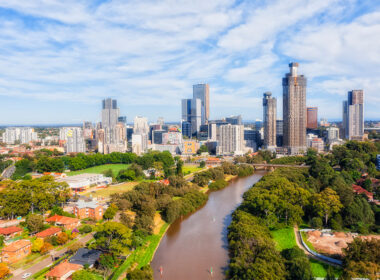The yet to be opened international airport in Western Sydney is the most potent symbol of a region undergoing rapid transformation. But it tells only part of the story of an area long known for its diversity and the pressures of development.
On a clear, sunny day, you can see the skyline of Sydney from 40km away. From the top of the hill where the city of Bradfield is being built, there are paddocks with cows and a sign proudly pointing to Bradfield’s first (and, for now, only) building. A large banner welcomes people to “Australia’s first new city in 100 years.”
Give it 10 years and the view will be different. The paddocks will be replaced by asphalt and concrete. Busy streets will surround parks, mid-rise apartment buildings, restaurants, schools, shops, cars and people. If government projections are accurate, the city centre alone will house between 15,000 and 23,000 people by 2056, taking over a million square metres of space and providing more than 20,000 jobs.
The shadow of the future looms over this yet to be developed land. This metamorphosis will spread to the surrounding areas. The 40km between Bradfield and Sydney houses more than 800,000 people in the Local Government Areas (LGAs) of Fairfield, Liverpool and Bankstown, which represents 10.4 per cent of the population of NSW.
According to the government’s forecast, the population is expected to grow by over 50 per cent in the next twenty years, way above the expected median growth of the state in the same period. Pushed by housing and rental prices in Sydney, new transport options like the metro are expected to link Lakemba and Bankstown to Sydenham by 2026. New zoning laws are aimed at dealing with the housing crisis and new migrants are joining already settled communities.
The expanse opens up exciting opportunities for communities that have stood on the fringe of Sydney for far too long. It attracts investment. It brings cities together. Investment beckons. Greater Sydney stands ready to become more connected as communities are galvanised with colour and culture. “We have become not a melting pot but a beautiful mosaic,” said United States President Jimmy Carter, in reference to cultural diversity in his country. Walk around Sydney’s west, including its southwest, and you’ll also see a mosaic. But, for all the poetry we can muse on about the strength of diversity, one question remains: is the infrastructure in these regions capable of accomodating such a massive transformation?
The Journal visited four suburbs and spoke to local legal professionals about how they perceive the future of their communities and how they’re preparing for the challenges coming their way. The reality that Australia is one of the most multicultural countries in the world is clearest, not on the rocky shores of Sydney’s Eastern Suburbs, but on the vibrant plains of the west.
Life on the peninsula
“The old days were better,” says George Elias, Director of Elias Gates in Revesby. In this context, he’s talking about how the modernisation of archives forced his practice to invest more in technology and cybersecurity to protect the information of clients. “One breach will ruin a business”, notes his son Jon-Pierre Elias, a director at the same firm. The observation from the senior Elias is correct—the old days were better when, in this instance, firms could safely store information in safes—but talking to father and son, and their family law colleague Anastasia Robinson, makes me think that George does look at the humble beginnings of his firm with the warm fondness of nostalgia.
George arrived in Revesby four decades ago. In 1984, he joined forces with his partner and high school buddy, Mark Gates, to found their practice in the area. At first, it was a small, one-man practice in a bit of office space, but it slowly evolved into the nine-person outfit they currently have in the shop-front building next to the local post office.
Initially, it was a general practice; “lawyers used to do a lot of things,” George recalls. However, as the practice expanded, so did the need for support in specific areas of law. Nowadays, Elias Gates works on property, business, family, criminal, litigation, estates and family provision.

This reflects how much the area has changed over these several decades. George notes how Revesby used to be made up predominantly of war veterans who came back from World War II, mainly of English, Scottish and/or Irish descent. In the following 30 years, new communities, particularly Chinese, Vietnamese and Lebanese, started moving in and joining the old generation that remained.
“In those days, people that lived in this little peninsula (Padstow, Revesby, Panania, Picnic Point and Milperra) would never cross Canterbury Road to go to Bankstown,” George says. “They had everything here, secluded in the boundary of the Georges River.
“There was a village atmosphere, a family atmosphere.”
Then came progress. New highways connected the peninsula to Bankstown and the rest of Western Sydney. The express train to Sydney Central allowed travel to the city in just over 25 minutes. People from other suburbs started to move in, searching for a secluded place not far from the city, and one that George still calls “a hidden gem.”
Elias Gates accompanied the suburb through this change. “We have clients from everywhere,” George says. “All over NSW and interstate. When they move out of the area, they retain us.”
Jon-Pierre notes that this metamorphosis is evident in their clients. The mum-and-dad small businesses of the past have become multi-million dollar outfits with national and international reach, and they still keep their factories and offices in the region. The following generation will take on their grandparents’ solicitors regardless of where they live.
It looks like generations taking the mantle is inherent to the practice, but Jon-Pierre points out he earned his spot next to his father. “He didn’t want us kids to be lawyers,” confesses Jon-Pierre. “I did a degree to make it look good in the resume [but] as I was doing it, I realised I enjoyed it.” When a temporary position came up as a paralegal, he took it – working from the bottom while studying. Today, two of the three siblings are lawyers.
After decades in the main street, Elias Gates depends on its reputation. “We have clients from the city coming here because of the human element and the kindness,” says Robinson. “They either [came here] because of word of mouth or used someone in the city because they thought they were better before and decided to now try someone closer.”

“Law isn’t justice. Unfortunately they’re not the same thing.”
This personalised approach is part of their fabric. Jon-Pierre points out that, contrary to city firms, Elias Gates doesn’t put a significant emphasis on billable hours. “We can advise clients for half an hour, and we’re not going to charge them, especially if [they are] senior citizens or widows,” says George. It becomes a reciprocal situation; a client who owns a coffee shop may one day not charge them for coffee. “It’s not a barter system if you’re doing it out of the goodness of your heart,” says Jon-Pierre. “there’s reciprocal generosity.”
Elias Gates has no formal pro-bono policy, but they often don’t charge clients if they feel it can help under the circumstances. Back in the day, George used to provide free advice to members at the Revesby Workers’ Club – three hours a day every other Tuesday. They continue to support their community, offering discounted services to local Christian and Alawi organisations.
It all depends on the situation and the circumstances of the client. Jon-Pierre recalls a recent estate case where the firm waived the fee on an estate case for a Filipino lady, and suggested she donate the money to charity.
They view the upcoming expansion of Revesby with excitement and trepidation. Recent changes to planning guidelines have opened the door to medium rise apartment buildings of up to six storeys around the railway station, changing the traditionally low-rise suburb’s skyline and its tight-knit cultural fabric. The problem lies in whether the area is prepared for this influx. George notes that talks of a courthouse in the suburb come up occasionally, but no one takes the step. In the meantime, most legal issues are dealt with in Bankstown, whether at the Local Court or the Justice Support Centre. George also mentions that the local police station “used to be very active.” Now, most of the work is sent to Bankstown. According to the 2021 census, almost 40,000 people live in Revesby, Milperra, Picnic Point, Panania and Padstow but with the new plans for the area and how much it’s expected to grow in the next 10 to 20 years, it’s easy to see why this firm wants to expand legal infrastructure.
Rising costs have hit Elias Gates, just like every other business. Jon-Pierre proudly mentions that they didn’t let go of staff—not even hours—during COVID. “Because we consider everyone here family.” Since then, the costs of running the office have increased by 30 per cent. “It has really affected us,” admits Jon-Pierre. “And it’s always trying to find a balance [of] where can we cut costs? What are the wants rather than needs? How do we justify costs to clients and look after them? How do we look after staff?”
In the future, Jon-Pierre would like to expand and modernise, refurbish, add more space, and maybe have a bigger boardroom. He calls it “old-school”, but his father knows the charm that surrounds him. “It’s heritage listed,” jokes George. Surrounded by books, files, and South Sydney Rabbitohs memorabilia, it’s hard to disagree with him. Ultimately, it doesn’t matter if the old days were better; there’s always a place for growth.

“We can advise clients for half an hour, and we’re not going to charge them, especially if [they are] senior citizens or widows”
In the eye of the storm
In an inconspicuous corner of Bankstown’s CBD—opposite a large car park but still a few minutes’ walk from the bustling city plaza—is a tall building that most wouldn’t pay attention to if it wasn’t for the fact that it houses the city’s police station. We also find the local community legal centre (CLC), the Justice Support Centre (JSC).
The JSC opened in 1986, starting as a community legal centre. As the area and its population grew, so did their responsibilities. They took on board several programs, including South West Sydney’s Women’s Domestic Violence Court Advocacy Service, services of family domestic violence support, and training and education programs. The JSC wasn’t just for “legal” matters. “So we’ve kind of got a dual role”, explains Liz Simpson, Principal Solicitor of JSC, “in the sense that one part of our mission is to provide access to justice for the South West Sydney area, but as well—and it works hand-in-hand—providing women survivors, domestic violence survivors, with support and advocacy and trying to support them through domestic violence and rebuilding their life.”
Nowadays, the JSC supports the LGAs of Bankstown, Liverpool and Fairfield, providing support to 10 per cent of the population of NSW. Each area has a high concentration of low-income earners and culturally and ethnically diverse communities. According to the Socio-Economic Index for Areas (SEIFA) compiled by the Australian Bureau of Statistics (ABS), these are also some of the most disadvantaged LGAs in the State. Fairfield, Simpson points out, is number one, while both Bankstown and Liverpool stay in the top 20 and are 3rd and 4th across metropolitan areas.
“[I]t’s reflected in all the data we’ve been looking at in terms of legal need.” According to Simpson, JSC identified 600,000 people in those areas as needing some kind of legal assistance.
Since coming to the team a year ago, CEO Melanie Noden has addressed this urgent legal need and analysed the gaps they need to consider.
Bankstown feels less of a melting pot and more a vibrant tapestry of intertwined cultures. The Vietnamese community thrives on one side of the street with businesses, restaurants, shops and fishmongers. If I close my eyes, it almost feels like I’m in my grandma’s neighbourhood in Portugal—but with the sweet smell of fish sauce instead of coriander and salted cod. You can find great za’atar for breakfast only a few metres up the same street. It’s all seemingly woven together into this place. According to the last census, almost 47 per cent of the population residing in Bankstown wasn’t born in Australia, a considerable difference from the state median of 36 per cent.
Language barriers are one of the issues Simpson and her team are trying to tackle. She notices the importance of using accessible language when talking with clients for whom English is not their first language (perhaps not even a second or third). “You may need a couple of appointments to make sure that somebody’s got [the message] across,” Simpson says. Something like a divorce, which may involve a straightforward online application for many, can be a considerable barrier for others. “People need help just completing the form such as Victims Compensation to gain access to justice.”
The courts are busy, Simpson admits. The JSC provides duty law service every day at Bankstown and Liverpool and has just resumed its service at Fairfield. Simpson brings up the new JSC Duty Driving Legal Service at Fairfield Local Court. “On the first day there were eight underrepresented clients who’d never had advice on their driving offences.” She says they “needed that advice and then needed support making those submissions or finding out what else they needed to [do].”
Added to the work in court, which Noden points out not every CLC does, primarily due to a lack of resources, the JSC has clinics of support all over the South West. “[A] lot of the clients don’t know how to ring a service, or it’s just hard over the phone for them to properly understand what’s happening,” Simpson explains. “It means they can bring their documents and have a conversation where they’ll take away more.” The services are being expanded to several regions so that they are not centralised in the same areas, which is another hurdle for many people as some of the suburbs are isolated from good transport connections. Simpson tells the Journal the suburb of Miller, west of Liverpool, has many First Nations people living in public housing and is particularly isolated. “There’s no public transport, so we’ve been doing some work in that space jointly with Legal Aid.”
With Simpson and an assistant principal, eight solicitors work for the JSC. It’s not enough to service an area that needs so much support. Two criminal lawyers attend three different courts for the duty lawyer service, complemented by phone advice services for driving and traffic matters. The team is often the first referral to deal with victims’ compensation claims. “Already this year (as of April), we’ve done over 150 victim services applications,” says Simpson.

“We bracket these people into one. That’s a huge problem.”
Many of JSC’s clients carry physical and psychological trauma. The team often has to manage cases where the client is visibly distressed or anxious. Simpson says they ensure a trauma-informed approach is taken and that the client has appropriate support throughout the process. These are already complex situations that can be aggravated.
“People come and are a little bit frustrated, often overwhelmed,” Simpson says. “There’s the language issue but beyond that, people not knowing their rights. Even if they don’t get the legal outcome they want, at least we can explain their legal problem to them clearly.” It’s complicated to manage the expectations of people under trauma-induced stress. Some may feel their issue will be perfectly resolved in court with the help of the JSC. “It sounds trite, but law isn’t justice, unfortunately they’re not the same thing,” Simpson points out. “So, what might be a fair outcome may not be what they get.” Sometimes, she explains, it’s a matter of asking someone if they want to invest the time and energy of going to court.
Do their clients see value in this approach? Mostly, yes, says Simpson. “Over the years, I’ve noticed that … what people really hate is being mucked around talking in legalese where they don’t get an understanding,” she explains. “I think at least they appreciate the clarity and the honesty.”
Being involved in complex and traumatic situations can also affect the team’s solicitors. Noden reveals that until recently, there wasn’t much support available, but now they get individual supervision from an external counsellor. It was a shift for the team, even the caseworkers, but Noden believes this is now part of the culture.
Simpson notices the team’s commitment to their roles—even with the hurdles, the adversity, and the complex and traumatising cases. “I really see in all of the team of lawyers working at the JSC that what keeps everyone going is that deep commitment, that real kind of purpose and passion,” she says. “When we ask them, ‘What’s the thing you love the most?’, without fail, they’ll be either talking about an individual client or say it’s … supporting people.”
“People come and are a little bit frustrated, often overwhelmed. There’s the language issue but beyond that, people not knowing their rights. Even if they don’t get the legal outcome they want, at least we can explain their legal problem to them clearly.”
To support such a culturally diverse community, the JSC is acutely aware of the importance of language and culture. Noden talks about the benefit of having a lawyer from the Vietnamese community on the team who understands the language and the intricate details of the culture. “It makes a big difference,” she says. However, this approach to the many groups in the area needs to continue. The JSC is planning a new program to visit local faith-based cultural schools to ensure these communities trust the service and understand what it can help with. This is another reason that face-to-face outreaches are so important. “Many free legal providers give advice via telephone,” she explains, “while in the communities we are working with—more than half of South West Sydney residents don’t speak English as their primary language—it’s face-to-face, going out to those clinics, being in the communities, getting them confident to come to us [that works].”
Funding is therefore essential for the service. At the time of writing, funding hasn’t been secured for the next several years. Noden says statistics show how chronically underfunded and under-resourced the whole Western Sydney area is, getting only one-tenth of the funding based on legal need. The Attorney General of NSW, Michael Daley, confirmed the JSC would secure the base funding, but as Noden points out, “if we get our base funding, we’ll be needing to let go of staff.
“Half the population of Sydney lives in Western Sydney, and yet we’re not resourced to serve that,” Noden continues. And with the population growing even more, there’s added pressure to ensure the service keeps going and is reinforced. “It’s a really complex community,” Noden shares. “75 per cent of humanitarian resettlements are coming to Western Sydney, and it’s low socio-economic.” Because of this complexity and vulnerability, serving the community involves more work and takes longer. As Noden points out, it’s not just the lack of resources; it’s heavy demands on her team.
A community called Australia
When Muhammad Farooq was a young law student in Pakistan, he dreamed of, one day, working for the International Court of Justice. That is the reason he moved to Australia. Back home, he was a multifaceted solicitor, a life member of the Lahore High Court and a tax consultant. But his dream brought him to Sydney to gain more experience and to do meaningful work in human rights and labour issues. This origin story makes sense for Farooq. Even before we start recording our interview, he proudly shows us the work he does with his charity—from distributing food for Iftar during the holy month of Ramadan, blood drives in the community, organising the cleaning of a local park, protests against the Rohingya genocide, or programs to collect old sacred texts and holy Qurans for repair or to be respectfully disposed of. There’s honour and modesty in how he shows us the impact of his charity, Humanity & Community First. Farooq isn’t gloating; he’s showing genuine joy. “[This] was my dream as a youngster—how can I contribute to society, especially humanity?” Farooq ponders. “I am always worried.”
Farooq came with a purpose, but life got in the way. He got married, settled here, started to work, finished his studies and attained his practising certificate in 2004. Farooq opened his practice, Milestone Legal, in the city and in 2012, moved it to Lakemba on the main road, nestled between a café and bakery. From his office, you can look down onto the main boulevard of Lakemba, where every Ramadan, the Night Markets have become a cultural staple for not only the local Muslim community but the entire city of Sydney.
Since 2004, the population of Lakemba has grown by 18 per cent. It’s a hub for new migrants, mainly from Muslim communities across Asia. The problem, Farooq points out, is how these communities are now homogenised in the eyes of our political system. Within the Muslim community there are several subdivisions and ethnicities—Muslims from Pakistan, India, Lebanon, Bangladesh and Iraq for example. “If you’re in a place where the main language is English and the main religion is Christianity, you have the local club, and everyone will go there”, Farooq explains. “Each Muslim community wants to have their own mosque, place of gathering.”
To Farooq, for politicians to understand and tackle the socio-economic issues of the suburb, they need to stop looking at religion and instead understand the local culture in Lakemba. The suburb is a multicultural hub with people from Bangladesh, Pakistan, India, Iraq, Saudi Arabia, Lebanon, and elsewhere. “And what do we do? We bracket these people into one. That’s a huge problem.”
Farooq says vocational training centres in the area aren’t doing enough to reach newly arrived immigrants, including refugees, to explain what’s available to them. “First, you have a language problem? Do a course for six months. Then we’ll help you find an apprenticeship. After two years, you will start your life.”

In 2021, Farooq ran for the local council as an independent. His posters still adorn his office as a reminder of the step he took towards direct change. He seems to have a million ideas on how to improve Lakemba and they all come down to one thing—meet the people where they are and talk to them.
“I never saw TAFE, an educational institution or any universities come to the street level and talk to the people here,” he says. “Become better,” Farooq repeats, as a plea to show the community respect. Interestingly, he doesn’t see this lack of awareness as a problem of personal accountability but the responsibility of all of us, including the government. He says infrastructure is built and services exist, but no one is out there telling the new arrivals, people who may struggle with the language, what is and isn’t available.
This hands-on approach makes sense for Farooq. Anything that is in his reach to improve, he’ll do it—when a local park needs to be cleaned, he gathers his neighbourhood and his family to clean it and posts messages around to remind everyone using the park to keep it clean. If something can be done without the government’s help, he’ll organise a group to do it. But a lot of issues are beyond his capacity. In 2014, he and a group of business owners started the Lakemba Chamber of Commerce, and the first issue was to tackle shoplifting and gang activity. Streets were poorly lit and people felt unsafe. Nowadays, he says, the area is “totally peaceful”. Safety brings more business opportunities, and with more business opportunities comes the need for more housing.

“I don’t know if there’s a magic formula for distributing judges but I think it’s just a matter of people saying ‘I think we need more help here’.”
As expected, the chance for growth is an exciting prospect, but Farooq has reservations. The new metro line is scheduled to open in early 2026, connecting the suburb with central Sydney in just 22 minutes. Farooq welcomes this but warns it may also uproot many people in the community, if they’re unable to afford the rent.
Near the end of our conversation, Farooq admitts he had barely talked about his role as a solicitor. It’s true; he kept it all about the issues of his neighbours and what he could do to help them. Shoplifting was reduced in Lakemba because business owners told police about the areas that needed surveillance and the corners that needed more light. Or as he says: “It’s best looking after than … (to) ask the judge to release my friend from jail.”
‘It’s dynamic, it’s growing’
“You should come back another day for lunch,” solicitor Andrew Lee suggests, during our interview in Cabramatta. “Sure, what do you recommend?” I ask. Lee insists everywhere is good here, because they have to be to survive.
He takes me for a walk after our conversation, to show me the area. We sit down for a coffee, look at the Pai Lau Gate in Freedom Plaza. Opened in 1989 it features an inscription in five languages, Vietnamese, Laotian, Cambodian, Chinese and English – “The world is for us to share and respect.”
Lee grew up in the South West. He moved to Australia from Cambodia when he was four, went to university here, worked in government around the city, and then came back to where he started. “You get drawn back to it,” he says, laughing. Lee wanted to join the Air Force and started the application process, but decided it was taking too long.
He’s been a lawyer in the area for 25 years, working around Fairfield, Liverpool, and now in his own practice right opposite Cabramatta station. From this vantage point, he’s seen how much the area has changed.
Lee is also the President of the Liverpool Law Society. There’s a different dynamic from the city, he notes. Incomes are lower and there are many new arrivals and refugees. According to the 2021 census, over 70 per cent of the population in Cabramatta was born overseas, and more than 85 per cent had both parents born overseas as well. The area has historically been a hub for newly arrived migrants—Italian and eastern European first and then Vietnamese and Cambodian. The population’s legal demands differ from those of other parts of the State.
Lee’s work comes from being present in the community, some from referrals. He doesn’t do a lot of marketing to advertise his practice, but he knows others who do. Out on our walk, at every other shop, someone comes out to wave. It’s the simple things that seem to motivate him. “I mean, who doesn’t want to be driving a Ferrari? But if you don’t have it, you’re still surviving.”
“You can go to the city and go anywhere; it doesn’t matter. At the end of the day, you come out of the law school, you know you’re doing a decent job.”
The region experienced a political shake-up when independent Dai Le won the traditionally Labor seat of Fowler at the 2022 federal election. She was recently re-elected. Because it had been a safe seat, Lee believes politicians took it for granted. The change, he says, has had the desired effect for the region. “It’s dynamic, it’s growing.”
With changes come obstacles. Population growth is a big issue, especially if infrastructure like roads and hospitals doesn’t keep up. And this includes access to lawyers in the ever-growing community. “My understanding is in the regions, it’s always hard to attract lawyers,” Lee says. “Maybe it’s a harder place to work, having to stay away from the rest of their families, so I don’t know what we tell our government.”
The Local Court is one of the issues in his mind. “I spoke to some magistrates, and this region has probably one of the busiest courts in the whole state,” Lee says. He compares the court with the Downing Centre, which has about 12 magistrates, while Liverpool has only three presiding magistrates dealing with an increasingly higher volume of cases. “I don’t know if there’s a magic formula for distributing judges,” he says, “but I think it’s just a matter of people saying I think we need more help here.”
Like other solicitors we talked to, Lee doesn’t have a specific pro bono strategy, but he still provides free services unofficially, depending on the situation. “I used to … in the past,” he says. “[B]ut there are still people who come up to you, and if you feel there’s a need, sometimes you charge them very little—we don’t always need to count every single time we do pro bono.”
But does Lee feel optimism or trepidation about the future of the area? He’s not sure how to see it. He feels the opportunities for a new generation are there. “You can go to the city and go anywhere; it doesn’t matter. At the end of the day, you come out of the law school, you know you’re doing a decent job.” Or, in another way, the world is ours to share and be respected.






